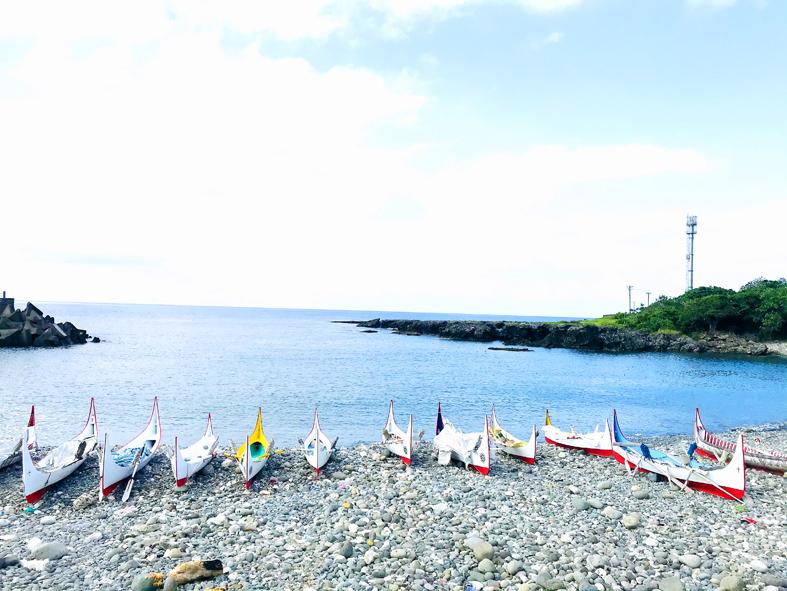Orchid Island (Lanyu, 蘭嶼) is the place to be to catch the first rays of sunlight of the new year, the Central Weather Bureau (CWB) said yesterday.
The first sunrise in Taiwan in the new year is to be seen on the island, southeast of Taitung County, the bureau said.
Sunrise would be at 6:32am on Saturday in Orchid Island’s Dongcing (東清), while on Taiwan proper, it would occur at 6:35am in Lungkeng (龍坑) in Pingtung County’s Kenting (墾丁) area, the bureau forecast.

Photo: Chen Hsin-yu, Taipei Times
The sunrise on Orchid Island can be seen from Taitung County’s Dawu Township (大武鄉), it added.
The New Year’s Day sunrise on Keelung Islet (基隆嶼), another popular scenic view, can be seen from Tiaoshih (跳石) in New Taipei City’s Jinshan District (金山), while Waiao Beach (外澳) in Yilan County’s Toucheng Township (頭城) would be a good place to see the sunrise over Turtle Island (Gueishan Island, 龜山島), the bureau said.
The sunrise over Taitung County’s Green Island (綠島) is expected to be another beautiful sight, and can be seen in the Jialulan (加路蘭) area of Taitung City.
People wishing to say goodbye to 2021 by watching the last visible sunset of the year in Taiwan proper should visit the seawall in Tainan’s Cigu District (七股) on Friday at 5:25pm.
In Kinmen County, the sunset would be visible at 5:29pm at Jiangong Islet (建功嶼) at the mouth of the Wujiang River (浯江溪) in Jincheng Township (金城) and at Cih Lake (慈湖).

Taiwan yesterday condemned the recent increase in Chinese coast guard-escorted fishing vessels operating illegally in waters around the Pratas Islands (Dongsha Islands, 東沙群島) in the South China Sea. Unusually large groupings of Chinese fishing vessels began to appear around the islands on Feb. 15, when at least six motherships and 29 smaller boats were sighted, the Coast Guard Administration (CGA) said in a news release. While CGA vessels were dispatched to expel the Chinese boats, Chinese coast guard ships trespassed into Taiwan’s restricted waters and unsuccessfully attempted to interfere, the CGA said. Due to the provocation, the CGA initiated an operation to increase

CHANGING LANDSCAPE: Many of the part-time programs for educators were no longer needed, as many teachers obtain a graduate degree before joining the workforce, experts said Taiwanese universities this year canceled 86 programs, Ministry of Education data showed, with educators attributing the closures to the nation’s low birthrate as well as shifting trends. Fifty-three of the shuttered programs were part-time postgraduate degree programs, about 62 percent of the total, the most in the past five years, the data showed. National Taiwan Normal University (NTNU) discontinued the most part-time master’s programs, at 16: chemistry, life science, earth science, physics, fine arts, music, special education, health promotion and health education, educational psychology and counseling, education, design, Chinese as a second language, library and information sciences, mechatronics engineering, history, physical education

The Chinese military has boosted its capability to fight at a high tempo using the element of surprise and new technology, the Ministry of National Defense said in the Quadrennial Defense Review (QDR) published on Monday last week. The ministry highlighted Chinese People’s Liberation Army (PLA) developments showing significant changes in Beijing’s strategy for war on Taiwan. The PLA has made significant headway in building capabilities for all-weather, multi-domain intelligence, surveillance, operational control and a joint air-sea blockade against Taiwan’s lines of communication, it said. The PLA has also improved its capabilities in direct amphibious assault operations aimed at seizing strategically important beaches,

‘MALIGN PURPOSE’: Governments around the world conduct espionage operations, but China’s is different, as its ultimate goal is annexation, a think tank head said Taiwan is facing a growing existential threat from its own people spying for China, experts said, as the government seeks to toughen measures to stop Beijing’s infiltration efforts and deter Taiwanese turncoats. While Beijing and Taipei have been spying on each other for years, experts said that espionage posed a bigger threat to Taiwan due to the risk of a Chinese attack. Taiwan’s intelligence agency said China used “diverse channels and tactics” to infiltrate the nation’s military, government agencies and pro-China organizations. The main targets were retired and active members of the military, persuaded by money, blackmail or pro-China ideology to steal